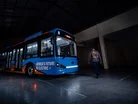Roam electrifies Kenya’s buses and offers EV motorcycle

Mobility in Africa is significantly more challenging in comparison to Europe and the US. On the topic of electric mobility (e-mobility)—introducing electric public transport—the country is expectedly lagging behind due to these challenges.
But electric vehicles (EVs) are on the agenda and provide benefits to citizens, businesses in the country, and the climate with potential reductions of 0.6 megatonnes of carbon dioxide equivalent (MtCO2e) in comparison to the ‘business-as-usual scenario’ in 2030.
One of the key players in the shift to e-mobility is Roam. The organisation was previously named Opibus before its rebranding—a name that earned the company a place in TIME’s 100 Most Influential Companies.
Electrifying transport to decarbonisation mobility in Kenya
In August 2022, the company took a leap into e-mobility and launched its electric mass transit bus. The company’s first showcase of e-mobility came in the form of its ‘Move’ model, which showcased the ability to operate an EV on Kenya’s roads.
The vehicle was produced as a 36-seater with capacity for 41-54 standing passengers and a 320km (just under 200 miles) on a single charge. The Roam Move was instrumental in the company’s development as a test bed for the harsh conditions that public transport vehicles are faced with.
The latest model is the most significant and resembles that of a modern-style bus. With a battery capacity of 384kWh and a slightly longer range of 360km (over 220 miles) per charge, the Roam Rapid is the name given to its bus that is capable of seating up to 90 passengers and has a payload of 18 tonnes.
Not only does the Roam Rapid mark a new era of e-mobility, but safer transport for the population in Kenya that rely on public transport solutions.
“The solution Roam brings to the Kenyan market enables us to move people safely, comfortably and timely in both a sustainable and affordable way,” says Dennis Wakaba, Project Coordinator at Roam.
“The bus is designed not only to increase comfort and lower cost but, more importantly, focuses on the well-being of the population through reduced noise pollution and eliminating local emissions, improving air quality for the cities across Africa.”
Another EV solution is micro-mobility
Roam has recognised that public transport won’t solve everything and therefore incorporates micro-mobility into its strategy. The company recognises that mobility offers sustainability benefits, but also opportunities to employ much of the up and coming workforce.
Changing its name from Opibus shows the company's shift in trajectory as it looks to provide equity in the country and address the global climate crisis and plan for the future. The country’s motorcycle industry is estimated to employ over 1.2 million young people and is booming with over 1.6 million motorcycle’s on its register—around 16,500 motorcycles are imported monthly.
Understanding the potential for development and the need to localise the production of its motorcycles from a sustainability standpoint, it’s a ‘no-brainer’ for Roam to drive this business forward.
- Voltpost Secures Grants for Nationwide Lamppost EV ChargersCharging & Infrastructure
- San Francisco Expands Curbside EV Charging ProgrammeCharging & Infrastructure
- Hyundai Invests US$16.6bn in EVs and Hydrogen InnovationMobility
- Nissan's Bold Manufacturing Move: Electrifying the R32Technology


